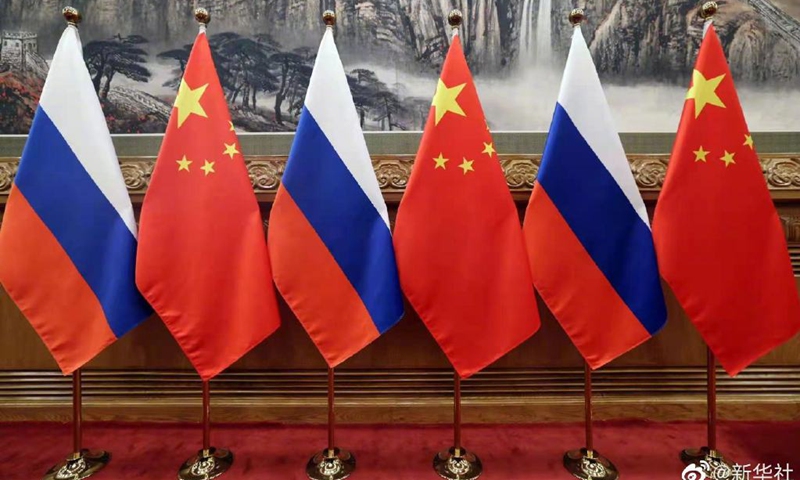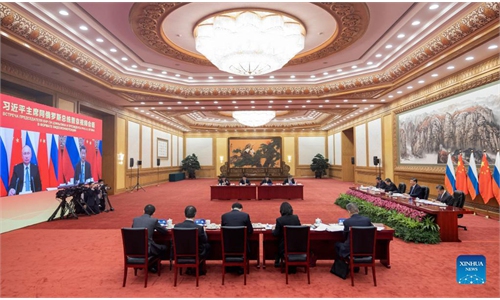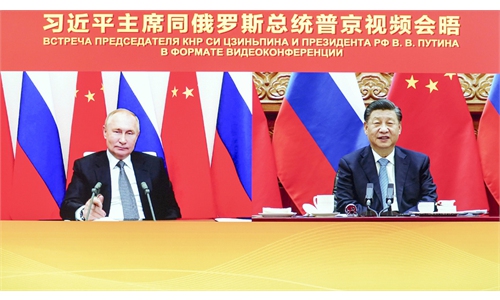
China Russia Photo: Xinhua
Editor's Note:Chinese President Xi Jinping and Russian President Vladimir Putin met on Wednesday via video link. The meeting was held amid rising tensions on the Russia-Ukraine border and mounting Western pressure piled on Beijing over alleged human rights abuses. During the meeting, both leaders hailed relations between China and Russia. Xi said that the Russian president "strongly supported China's efforts to protect key national interests and firmly opposed attempts to drive a wedge between our countries," and Putin declared bilateral relations "a proper example of interstate cooperation in the 21st century." What is the significance of the meeting at this moment? Why is the West incapable of driving a wedge between China and Russia? The Global Times collected views from two Russian experts.
Danil Bochkov, an expert at the Russian International Affairs Council
The summit is very important as it happened at a crucial time for relations with the US and its allies. Beijing and Moscow want to demonstrate that they are united in their desire to oppose any external pressure and present a common front on the issues of international concern to avoid being isolated. This summit will contribute to the acceleration of deepening ties and could foster bilateral cooperation in the areas raised during the presidential talks including digital currency, bilateral trade in national currencies, energy cooperation, coordination of actions on international platforms and forums such as the UN.
President Putin said that "a new model of cooperation has been formed between our countries." Officially the new model of bilateral relations is defined as a partnership with no limits and boundaries for deeper collaboration preserved by the common recognition and mutual respect to both parties' national interests. Still, it poses no threat to third parties as Moscow and Beijing do not seek an alliance. Both sides separate relations with other global powers and are not significantly affected by their closer cooperation on the bilateral level. However, other countries are not happy with the growing entente between Moscow and Beijing which creates opposition in the West but not in China or Russia.
The US and Western countries recently hyped the so-called Chinese and Russian threats in a high profile. Such rhetoric is ostensibly aimed at a collection of alliances and partners united under the same slogan of opposing rising threats from Russia and China. And it is openly proclaimed and implemented by NATO's classification of China as a challenge and US President Biden's attempts to gather "democratic states" to preserve the world from falling into the Moscow-Beijing axis of so-called orchestrated autocracies. All these stigmas help to differentiate countries into "good" and "bad" and invite active cooperation to oppose them. However, a military confrontation is not likely since all parties involved clearly comprehend the irreversible damage such scenario could inflict internationally.
Russia-China cooperation is driven by a broader range of issues and is not necessarily tied to rising pressure from the West. Moscow and Beijing signed the Treaty of Good-Neighborliness and Friendly Cooperation long before their relations with the West plunged. Since then, they have been building on that foundation and expended it. So, it did not happen out of nowhere and just because of frayed ties with the US. It was already in action and has been motivated by common interested such as regional security and stability. The establishment of the Shanghai Cooperation Organisation in 2001 is just one more example that the Russia-China entente is motivated by larger issues than just the rivalry with the West.
Yury Tavrovsky, head of "Russian Dream-Chinese Dream" analytic center of the Izborsk Club
The West is rising tensions and mounting pressure to create a strong image. Actually, events of the past few months demonstrate the contrary. It is not only the Afghanistan fiasco. By organizing the "Summit for Democracy," the US admitted its weakness in containing Russia and China at the same time by itself and had to mobilize forces.
In the Cold War against the Soviet Union, the US relied mostly on its own resources. Even US President Joe Biden's initiative to hold a video summit with Putin stemmed out of hopes to stop further coordination of policies between Moscow and Beijing. Washington is trying to plant suspicion among leaders and prevent further development of the Russia-China strategic partnership.
Preparations in Moscow and Beijing for the in-person meeting in February are in full swing and it is crucial to avoid any misunderstanding.
The US and West are very efficient in pushing Russia and China together. Many Western experts and politicians understand it and advise leaders of their countries to stop this self-destructing strategy of waging a cold war on two fronts at the same time. We can see the results in Washington's hints at compromises with Moscow. But Russophobia and Sinophobia in Western elites are much stronger. A cold war will go on.
Our experience of the West hindering and boycotting the Olympic Games of 1980 in Moscow and 2014 in Sochi shows that it is important to fulfill international obligations and disregard the enemy. President Xi was in Sochi and supported Putin as much as he could. Putin will reciprocate and the Russians hope to see another "Chinese miracle" in February.
Russia and China are getting closer because their national interests often coincide and create a synergy in fields like security. There are no contradictions, only inevitable misunderstandings between business partners. This is not enough to drive a wedge between China and Russia. The ruling elites in Moscow have reached a consensus on the importance of cooperation with China and will not permit pro-Western media to spoil it.

China Russia Photo: Xinhua
Editor's Note:Chinese President Xi Jinping and Russian President Vladimir Putin met on Wednesday via video link. The meeting was held amid rising tensions on the Russia-Ukraine border and mounting Western pressure piled on Beijing over alleged human rights abuses. During the meeting, both leaders hailed relations between China and Russia. Xi said that the Russian president "strongly supported China's efforts to protect key national interests and firmly opposed attempts to drive a wedge between our countries," and Putin declared bilateral relations "a proper example of interstate cooperation in the 21st century." What is the significance of the meeting at this moment? Why is the West incapable of driving a wedge between China and Russia? The Global Times collected views from two Russian experts.
Danil Bochkov, an expert at the Russian International Affairs Council
The summit is very important as it happened at a crucial time for relations with the US and its allies. Beijing and Moscow want to demonstrate that they are united in their desire to oppose any external pressure and present a common front on the issues of international concern to avoid being isolated. This summit will contribute to the acceleration of deepening ties and could foster bilateral cooperation in the areas raised during the presidential talks including digital currency, bilateral trade in national currencies, energy cooperation, coordination of actions on international platforms and forums such as the UN.
President Putin said that "a new model of cooperation has been formed between our countries." Officially the new model of bilateral relations is defined as a partnership with no limits and boundaries for deeper collaboration preserved by the common recognition and mutual respect to both parties' national interests. Still, it poses no threat to third parties as Moscow and Beijing do not seek an alliance. Both sides separate relations with other global powers and are not significantly affected by their closer cooperation on the bilateral level. However, other countries are not happy with the growing entente between Moscow and Beijing which creates opposition in the West but not in China or Russia.
The US and Western countries recently hyped the so-called Chinese and Russian threats in a high profile. Such rhetoric is ostensibly aimed at a collection of alliances and partners united under the same slogan of opposing rising threats from Russia and China. And it is openly proclaimed and implemented by NATO's classification of China as a challenge and US President Biden's attempts to gather "democratic states" to preserve the world from falling into the Moscow-Beijing axis of so-called orchestrated autocracies. All these stigmas help to differentiate countries into "good" and "bad" and invite active cooperation to oppose them. However, a military confrontation is not likely since all parties involved clearly comprehend the irreversible damage such scenario could inflict internationally.
Russia-China cooperation is driven by a broader range of issues and is not necessarily tied to rising pressure from the West. Moscow and Beijing signed the Treaty of Good-Neighborliness and Friendly Cooperation long before their relations with the West plunged. Since then, they have been building on that foundation and expended it. So, it did not happen out of nowhere and just because of frayed ties with the US. It was already in action and has been motivated by common interested such as regional security and stability. The establishment of the Shanghai Cooperation Organisation in 2001 is just one more example that the Russia-China entente is motivated by larger issues than just the rivalry with the West.
Yury Tavrovsky, head of "Russian Dream-Chinese Dream" analytic center of the Izborsk Club
The West is rising tensions and mounting pressure to create a strong image. Actually, events of the past few months demonstrate the contrary. It is not only the Afghanistan fiasco. By organizing the "Summit for Democracy," the US admitted its weakness in containing Russia and China at the same time by itself and had to mobilize forces.
In the Cold War against the Soviet Union, the US relied mostly on its own resources. Even US President Joe Biden's initiative to hold a video summit with Putin stemmed out of hopes to stop further coordination of policies between Moscow and Beijing. Washington is trying to plant suspicion among leaders and prevent further development of the Russia-China strategic partnership.
Preparations in Moscow and Beijing for the in-person meeting in February are in full swing and it is crucial to avoid any misunderstanding.
The US and West are very efficient in pushing Russia and China together. Many Western experts and politicians understand it and advise leaders of their countries to stop this self-destructing strategy of waging a cold war on two fronts at the same time. We can see the results in Washington's hints at compromises with Moscow. But Russophobia and Sinophobia in Western elites are much stronger. A cold war will go on.
Our experience of the West hindering and boycotting the Olympic Games of 1980 in Moscow and 2014 in Sochi shows that it is important to fulfill international obligations and disregard the enemy. President Xi was in Sochi and supported Putin as much as he could. Putin will reciprocate and the Russians hope to see another "Chinese miracle" in February.
Russia and China are getting closer because their national interests often coincide and create a synergy in fields like security. There are no contradictions, only inevitable misunderstandings between business partners. This is not enough to drive a wedge between China and Russia. The ruling elites in Moscow have reached a consensus on the importance of cooperation with China and will not permit pro-Western media to spoil it.


